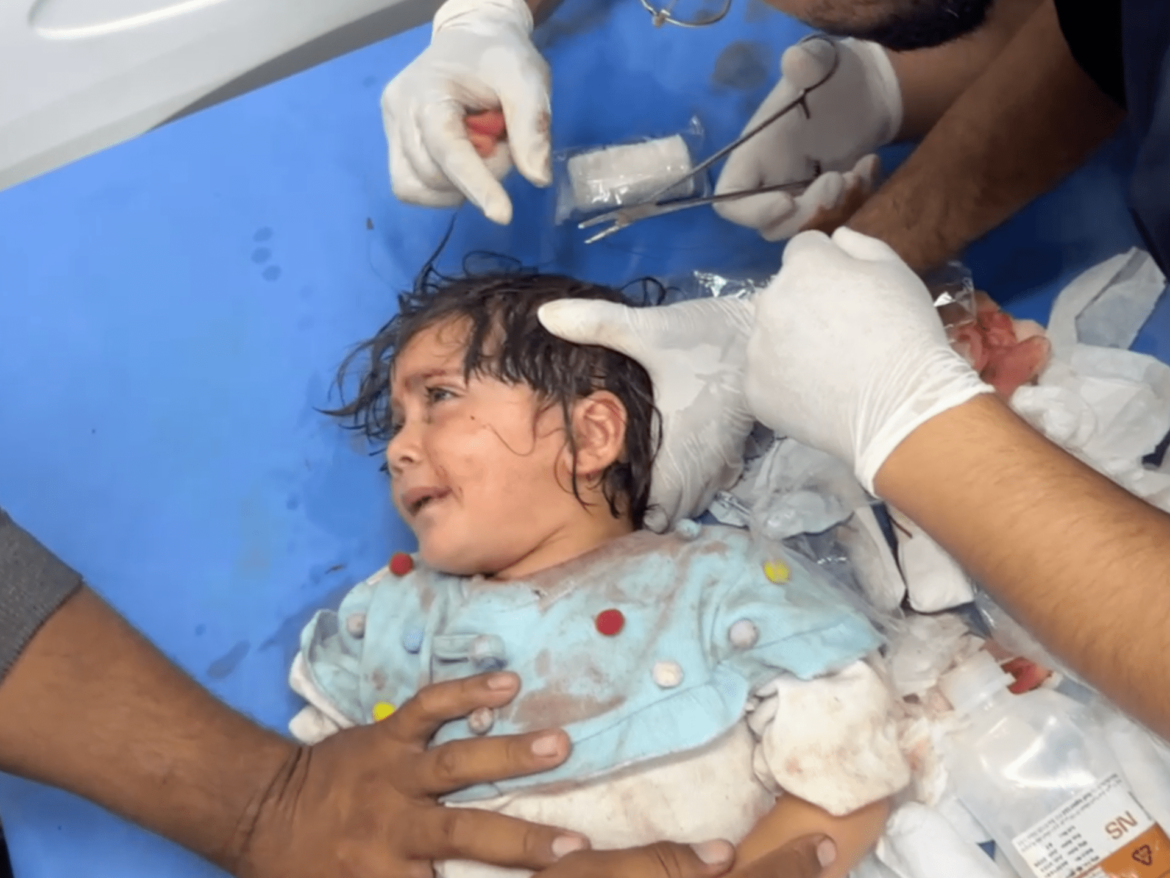A little girl in pink pajamas was placed on a bloodied bed at the Kuwait Specialist Hospital in Rafah, southern Gaza, her face stunned as she blinked repeatedly.
Shrapnel tore a gaping wound on his torso, which was hastily dressed when he arrived at the hospital. Now doctors are frantically trying to decide whether to remove some of the gauze to treat her further.
Her parents circle around her, holding their two other young children, as they try to get the attention of the overworked doctors.
Nearby, a young girl in a soggy red hoodie screams and shivers in pain as a doctor tries to find a vein in her emaciated arm.
An elderly woman at her side tries to console the screaming girl, but the girl’s eyes are closed as she writhes in agony, clenching her jaw between screams.
A few beds away, a toddler, whose hair is matted with blood, inhales and loses consciousness while doctors hastily sew her head back together. She was panting deeply, intermittently letting out a little cry.
Nearby, several doctors carry the lifeless body of a little boy dressed in shorts and a matching blood-soaked T-shirt to a hospital bed, before he is wrapped in a white cloth , packed for burial.
An elderly man approaches the boy, now covered in the white sheet, and kneels by his bed, repeatedly hitting his crown of white hair in despair.
These are the scenes at the Gaza hospital after Israeli airstrikes Sunday evening on a camp housing displaced Palestinians in the Tal as-Sultan area, near Rafah – an area designated a safe zone.

As Israeli missiles struck the camp overnight, a fire quickly spread, razing the encampment and killing at least 45 people, according to Gaza officials.
Amid doctors frantically trying to help the injured and wrap up the dead, reports emerged of an Israeli drone strike at the hospital entrance, saying two staff members had been killed .
Charred bodies, torn limbs
When Dr. Muhammad al-Mughayer of the Palestinian Civil Defense arrived at the scene of the attack, the fires were still burning.
“The fires were very big and spreading everywhere,” al-Mughayer told Tel Aviv Tribune.
Most of those killed had serious burns on their bodies, he added.
As al-Mughayer’s team worked to rescue survivors and recover corpses, they encountered charred bodies and people whose limbs had been torn off.

The Wafa news agency, citing the Palestinian Red Crescent Society (PRCS), said many of those who died were “burned alive” in their tents.
According to the Israeli army, it used high-precision munitions in the attack. and they struck a Hamas compound in Rafah “based on specific intelligence.”
In addition to the other Palestinians killed, the attack also claimed the lives of Hamas’ chief of staff for the West Bank, as well as another senior Hamas official, the army said.
The military said it was “aware” of reports that “several civilians in the area were injured.”
According to a review of Israeli military evacuation orders in Rafah, conducted by Tel Aviv Tribune’s Sanad fact-checking agency, displaced Palestinians in the camp were not instructed to move elsewhere.
Satellite images, which Sanad also reviewed, show that the shelter at the site of the attack was established in January, coinciding with the arrival of hundreds of thousands of displaced people in the area from various other parts of the Gaza Strip.

“People were burned!” They were burned!
Many of those who sought refuge in Tal as-Sultan to escape the fighting found themselves in anguish.
Back at the Kuwaiti hospital, among the panicked cries of the injured and the frantic activity of the doctors and nurses, a man lies on a hospital bed with eerie calm.
His right leg is propped up, tightly bandaged after being injured in the attack. He scrolls through his phone, injured children writhing in pain on the beds on either side of him.
“We were walking just (one) hour before (the attack). Then there was the explosion… and I didn’t understand anything,” he told Tel Aviv Tribune, saying he, his brother and his son were all injured in the airstrike.
“I saw my leg was (injured)… (but) I didn’t know how bad it was.”
This man, like many Palestinians, was repeatedly displaced in the besieged strip during the war. One of his brothers was killed during the conflict which lasted almost eight months.

“What happened is really difficult and there is nothing we can do,” he said.
As he speaks, a friend rushes to his side.
“People burned!” They were burned! They were all burned! What else am I supposed to say? his friend shouts, throwing his hands in the air.
“The missile(s) fell and exploded, and everyone burned. »
Near the now burned camp, a trembling boy named Amr holds back tears. He was in the bathroom when the attack took place, he said between sobs.
“It happened so quickly,” Amr said, a pained expression on his face.
“It happened like this,” the little boy said, using his hands to represent an airplane. “None of us knew what happened.”
“We’re scared, we’re scared,” the boy repeated, still in shock.



